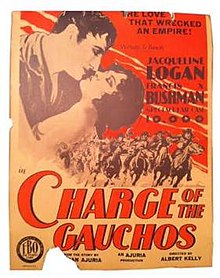The Charge of the Gauchos
| The Charge of the Gauchos | |
|---|---|
 |
|
| Directed by | Albert H. Kelley |
| Produced by | Julián Ajuria |
| Written by |
W.C. Clifford Garrett Graham Julián Ajuria |
| Starring |
Francis X. Bushman Jacqueline Logan Guido Trento Paul Ellis |
| Cinematography |
Georges Benoît Nicholas Musuraca |
| Edited by | George Nichols Jr. |
|
Production
company |
Ajuria Productions
|
| Distributed by | FBO |
|
Release date
|
March 10, 1928 (Argentina) September 16, 1928 (US) |
| Country | Argentina United States |
| Language | Silent Spanish/English intertitles |
The Charge of the Gauchos (Argentine title:Una nueva y gloriosa nación) is a 1928 American-Argentine silent historical film directed by Albert H. Kelley and starring Francis X. Bushman, Jacqueline Logan and Guido Trento. Bushman plays Manuel Belgrano, the leader of the 1810 May Revolution. The film's Spanish title refers to a line from the Argentine national anthem. It was made as a patriotic endeavor designed to boost the small Argentine film industry, but with enough action and romance to appeal to international audiences particularly in Britain and the United States.
The Spanish-born Argentine producer Julián Ajuria was unhappy with previous representations of Argentina in Hollywood films. After failing to secure Hollywood backing for his project, he raised the finances elsewhere but decided to shoot in America with a largely American cast in order to boost the film's chances of a good release there. Bushman had been a major star during the silent era, although his career was starting to decline.
Ajuria went to great lengths to recreate authentic costumes and settings of the period. During its production, the film was criticized by Argentine newspapers who felt that it would be another Hollywood-style retelling of Argentina's history, but these attitudes began to change once preview screenings were held.
The film premiered on March 10, 1928 at the Cervantes Theatre in Buenos Aires. It went on release in the United States in September the same year, distributed by FBO which shortly afterwards merged into the major RKO Pictures. The running time of the film was significantly cut down, and it was generally shown as part of a double bill. It was not successful, partly due to the arrival of sound which made silent films noncommercial. However, in Argentina it was exceptionally popular, and remained in release for two whole years. It was the most popular silent film ever released in the country. Ajuria's hope that it would stimulate the creation of an Argentinian film industry, but this not immediately happen.
...
Wikipedia
